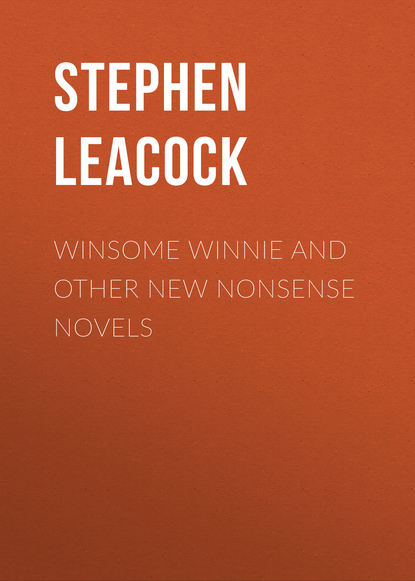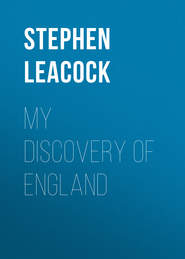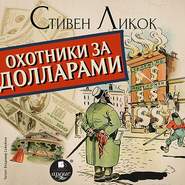По всем вопросам обращайтесь на: info@litportal.ru
(©) 2003-2025.
✖
Winsome Winnie and other New Nonsense Novels
Автор
Год написания книги
2019
Настройки чтения
Размер шрифта
Высота строк
Поля
"Will the Wazoo rise?" asked Angela, clasping her hands before her, while her great eyes sought the young man's face and found it. "Oh, Mr. Powers! Tell me, will they rise? It seems too dreadful to contemplate. Do you think the Wazoo will rise?"
"It is only too likely," said Powers. They stood looking into one another's eyes, their thoughts all on the Wazoo.
Angelina Elphinspoon, as she stood there against the background of the begonias, made a picture that a painter, or even a plumber, would have loved. Tall and typically English in her fair beauty, her features, in repose, had something of the hauteur and distinction of her mother, and when in motion they recalled her father.
Perriton Powers was even taller than Angela. The splendid frame and stern features of Sir John's secretary made him a striking figure. Yet he was, quite frankly, sprung from the people, and made no secret of it. His father had been simply a well-to-do London surgeon, who had been knighted for some mere discoveries in science. His grandfather, so it was whispered, had been nothing more than a successful banker who had amassed a fortune simply by successful banking. Yet at Oxford young Powers had carried all before him. He had occupied a seat, a front seat, in one of the boats, had got his blue and his pink, and had taken a double final in Sanscrit and Arithmetic.
He had already travelled widely in the East, spoke Urdu and Hoodoo with facility, while as secretary to Sir John Elphinspoon, with a seat in the House in prospect, he had his foot upon the ladder of success.
"Yes," repeated Powers thoughtfully, "they may rise. Our confidential despatches tell us that for some time they have been secretly passing round packets of yeast. The whole tribe is in a ferment."
"But our sphere of influence is at stake," exclaimed Angela.
"It is," said Powers. "As a matter of fact, for over a year we have been living on a mere modus vivendi."
"Oh, Mr. Powers," cried Angela, "what a way to live."
"We have tried everything," said the secretary. "We offered the Wazoo a condominium over the desert of El Skrub. They refused it."
"But it's our desert," said Angela proudly.
"It is. But what can we do? The best we can hope is that El Boob will acquiesce in the status quo."
At that moment a manservant appeared in the doorway of the conservatory.
"Mr. Powers, sir," he said, "Sir John desires your attendance, sir, in the library, sir."
Powers turned to Angela, a new seriousness upon his face.
"Miss Elphinspoon," he said, "I think I know what is coming. Will you wait for me here? I shall be back in half an hour."
"I will wait," said the girl. She sat down and waited among the begonias, her mind still on the Wazoo, her whole intense nature strung to the highest pitch. "Can the modus vivendi hold?" she murmured.
In half an hour Powers returned. He was wearing now his hat and light overcoat, and carried on a strap round his neck a tin box with a white painted label, "British Foreign Office. Confidential Despatches. This Side Up With Care."
"Miss Elphinspoon," he said, and there was a new note in his voice, "Angela, I leave England to-night–"
"To-night!" gasped Angela.
"On a confidential mission."
"To Wazuchistan!" exclaimed the girl.
Powers paused a moment. "To Wazuchistan," he said, "yes. But it must not be known. I shall return in a month—or never. If I fail"—he spoke with an assumed lightness—"it is only one more grave among the hills. If I succeed, the Cabinet is saved, and with it the destiny of England."
"Oh, Mr. Powers," cried Angela, rising and advancing towards him, "how splendid! How noble! No reward will be too great for you."
"My reward," said Powers, and as he spoke he reached out and clasped both of the girl's hands in his own, "yes, my reward. May I come and claim it here?"
For a moment he looked straight into her eyes. In the next he was gone, and Angela was alone.
"His reward!" she murmured. "What could he have meant? His reward that he is to claim. What can it be?"
But she could not divine it. She admitted to herself that she had not the faintest idea.
CHAPTER III
In the days that followed all England was thrilled to its base as the news spread that the Wazoo might rise at any moment.
"Will the Wazoos rise?" was the question upon every lip.
In London men went to their offices with a sense of gloom. At lunch they could hardly eat. A feeling of impending disaster pervaded all ranks.
Sir John as he passed to and fro to the House was freely accosted in the streets.
"Will the Wazoos rise, sir?" asked an honest labourer. "Lord help us all, sir, if they do."
Sir John, deeply touched, dropped a shilling in the honest fellow's hat, by accident.
At No. 10 Downing Street, women of the working class, with children in their arms, stood waiting for news.
On the Exchange all was excitement. Consols fell two points in twenty-four hours. Even raising the Bank rate and shutting the door brought only a temporary relief.
Lord Glump, the greatest financial expert in London, was reported as saying that if the Wazoos rose England would be bankrupt in forty-eight hours.
Meanwhile, to the consternation of the whole nation, the Government did nothing. The Cabinet seemed to be paralysed.
On the other hand the Press became all the more clamorous. The London Times urged that an expedition should be sent at once. Twenty-five thousand household troops, it argued, should be sent up the Euphrates or up the Ganges or up something without delay. If they were taken in flat boats, carried over the mountains on mules, and lifted across the rivers in slings, they could then be carried over the desert on jackasses. They could reach Wazuchistan in two years. Other papers counselled moderation. The Manchester Guardian recalled the fact that the Wazoos were a Christian people. Their leader, El Boob, so it was said, had accepted Christianity with childlike simplicity and had asked if there was any more of it. The Spectator claimed that the Wazoos, or more properly the Wazi, were probably the descendants of an Iranic or perhaps Urgumic stock. It suggested the award of a Rhodes Scholarship. It looked forward to the days when there would be Wazoos at Oxford. Even the presence of a single Wazoo, or, more accurately, a single Wooz, would help.
With each day the news became more ominous. It was reported in the Press that a Wazoo, inflamed apparently with ghee, or perhaps with bhong, had rushed up to the hills and refused to come down. It was said that the Shriek-el-Foozlum, the religious head of the tribe, had torn off his suspenders and sent them to Mecca.
That same day the Illustrated London News published a drawing "Wazoo Warriors Crossing a River and Shouting, Ho!" and the general consternation reached its height.
Meantime, for Sir John and his colleagues, the question of the hour became, "Could the Cabinet be held together?" Every effort was made. The news that the Cabinet had all been seen together at the circus, for a moment reassured the nation. But the rumour spread that the First Lord of the Admiralty had said that the clowns were a bum lot. The Radical Press claimed that if he thought so he ought to resign.
On the fatal Friday the question already referred to was scheduled for its answer. The friends of the Government counted on the answer to restore confidence. To the consternation of all, the expected answer was not forthcoming. The Colonial Secretary rose in his place, visibly nervous. Ministers, he said, had been asked where Wazuchistan was. They were not prepared, at the present delicate stage of negotiations, to say. More hung upon the answer than Ministers were entitled to divulge. They could only appeal to the patriotism of the nation. He could only say this, that wherever it was, and he used the word wherever with all the emphasis of which he was capable, the Government would accept the full responsibility for its being where it was.
The House adjourned in something like confusion.
Among those seated behind the grating of the Ladies' Gallery was Lady Elphinspoon. Her quick instinct told her the truth. Driving home, she found her husband seated, crushed, in his library.
"John," she said, falling on her knees and taking her husband's hands in hers, "is this true? Is this the dreadful truth?"
"I see you have divined it, Caroline," said the statesman sadly. "It is the truth. We don't know where Wazuchistan is."
For a moment there was silence.
"But, John, how could it have happened?"














